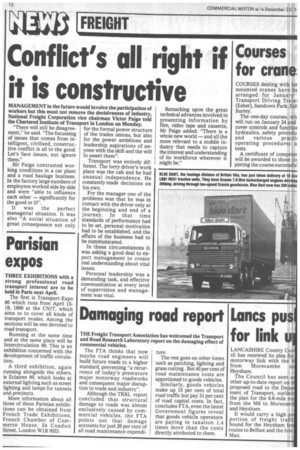Conflict's all right if it is constructive
Page 14

If you've noticed an error in this article please click here to report it so we can fix it.
MANAGEMENT in the future would involve the participation of workers but this must not remove the decisiveness of industry, National Freight Corporation vice chairman Victor Paige told the Chartered Institute of Transport in London on Monday. "There will still be disagreement," he said. "The focussing of issues that comes from intelligent, civilised, constructive conflict is all to the good. Let's face issues, not ignore them."
Mr Paige contrasted working conditions in a car plant and a road haulage business. In the factory large numbers of employees worked side by side and were "able to influence each other — significantly for the good or ill".
It was the perfect managerial situation. It was also "A social situation of great consequence not only for the formal power structure of the trades unions, but also for the power ambitions and leadership aspirations of anyone with the skill and the will to assert them".
Transport was entirely different. The lorry driver's work place was the cab and he had unusual independence. He constantly made decisions on his own.
For the manager one of the problems was that he was in contact with the driver only at the beginning and end of a journey. In that time standards of performance had to be set, personal motivation had to be established, and the affairs of the business had to be communicated.
In these circumstances it was asking a good deal to expect management to create real understanding about vital issues.
Personal leadership was a demanding task, and effective communication at every level of' supervision and management was vital. Remarking upon the great technical advances involved in presenting information by film, video tape and cassette, Mr Paige added: "There is a whole new world — and all the more relevant to a mobile industry that needs to capture the interest and understanding of its workforce wherever it might be."




















































































